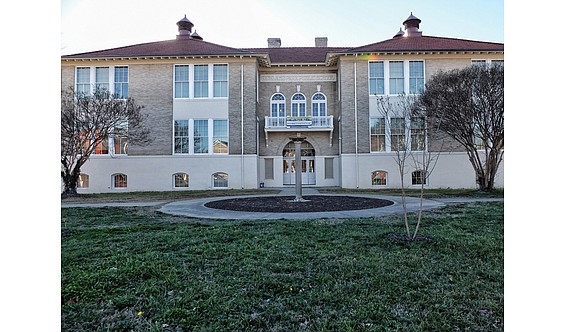Heat, water problems plague residents in new Highland Park apartment building
Jeremy M. Lazarus | 1/27/2017, 7:31 a.m.
Ernest L. Fox has stopped showering since moving into the new Highland Park Senior Apartments, a former school building being converted into 77 residential apartments at East Brookland Park Boulevard and Second Avenue.
“I can’t get any hot water,” said the retired welder, one of 24 residents who have moved into the incomplete building from the Richmond Redevelopment and Housing Authority’s Fay Towers, which is scheduled to close.
“I have to boil water to shave and wash myself,” said the 68-year-old Richmond native. “It’s really frustrating.”
Equally as frustrating is the heating situation at the building, residents said. During the cold snap in early January, Mr. Fox said he had to bundle up to stay warm inside his second-floor apartment because the heat did not work. He said his apartment wasn’t warm until last Friday when the maintenance staff raised the thermostat’s setting to 78 degrees and opened a heat vent in his bedroom.
Residents have limited control of their thermostats and can adjust them only between 68 and 72 degrees, according to Luann Tia Blount, a spokesman for the nonprofit developer, Community Preservation and Development Corp. of Silver Spring, Md.
Mr. Fox is not alone among new residents complaining about the complex that was supposed to be a major improvement over the aging Fay Towers and for the Highland Park area.
Mr. Fox and others related their latest problems with the building to the Free Press last Saturday after Ms. Blount insisted earlier last week that the hot water complaints had been handled.
CPDC is pouring $11.4 million into the project as part of carrying out its contract with the RRHA to replace the 200 units in Fay Towers.
But the new units have not satisfied Hazel Bachoo, 63, a production specialist with Ukrop’s Homestyle Foods. She said Saturday her hot water still isn’t working properly. “The water turns lukewarm when you’re taking a shower,” she said.
She also said her apartment isn’t warm enough on cold nights. While the thermostat in her apartment has been set at 74, the apartment felt drafty and cooler than the temperature setting.
Another tenant, Charlie Emanuel, a retired cook, said he wishes he could take a bath like he used to at Fay Towers, but he, too, has found that the hot water runs out before he can fill the tub.
And he worries about security after discovering that the security lock on the front door easily can be opened.
“I’ve reported it, but no one wants to listen. They just brush me off,” he said after showing a reporter how easily the door can be opened.
Visitors are supposed to call a tenant or the office and be buzzed into the apartment building after identifying themselves. However, the electronically controlled door opens by pressing two buttons without a visitor having to call anyone.
The complex was supposed to be finished last fall, but work is still being done on more than half the building. The city provided CPDC with a temporary occupancy permit for the completed portion while work continues in other parts of the building.
That has created problems for tenants at Fay Towers, who were tapped to occupy the units.
For example, Lindell Jackson and Shirley Tolliver packed up in October after being notified that their new apartments in Highland Park Senior Apartments would be ready shortly. But the move still hasn’t taken place. They now maneuver around the still packed items that fill the main rooms of their Fay Towers apartments.
Both feel that CPDC officials made promises they haven’t kept. And they are disappointed with the curt treatment they feel they have received from RRHA and CPDC apartment management staff in trying to get answers.
Ms. Jackson is now fearful that she’ll be forced to take a tiny efficiency apartment after being required to sign a lease without first seeing her new unit. She said CPDC keeps changing the unit she is to occupy while refusing to provide a moving date.
“I was promised an apartment similar in size to the one bedroom I now have,” she said. “But the only apartment I was shown was an efficiency with a tiny closet for a bedroom. There’s not enough room to fit the headboard of my bed.”
Instead of a joyful move to a new unit, “I’m so stressed out I can’t sleep,” said Ms. Jackson, who said she is embarrassed that she went on television last year to sing the praises of the new apartment development.
Ms. Tolliver, too, is upset about the planned move. Like Ms. Jackson, she used to work as a nursing assistant. Both are disabled.
She said that the move has become a “big mess.”
In response to Free Press questions, Ms. Blount said CPDC has ensured that its property manager, S.L. Nusbaum Realty Co., “ has worked with each resident to orient them to the new building and highlight differences between the plumbing and HVAC systems at Fay Towers versus Highland Park.”
She said the company has raised the temperature on hot water heaters to accommodate residents who say the water is not hot enough, although Mr. Fox, Ms. Bachoo and Mr. Emanuel said nothing has changed.
Ms. Blount said the thermostats typically are set no higher than 72 degrees to save on heating costs. But the thermostats in Mr. Fox’s and Mr. Emanuel’s units were set at higher temperatures because of their complaints.
As for Ms. Jackson’s concern that she might be shoehorned into a far smaller unit than at Fay Towers, Ms. Blount acknowledged that some of the units have “smaller bedrooms compared to what (residents) had at Fay Towers. RRHA and CPDC have worked considerably to assign each resident to a unit that matches their needs.”
She added, “We placed a high priority on residents with handicaps or limited mobility and are continuing to work to try to accommodate every resident where feasible.”







